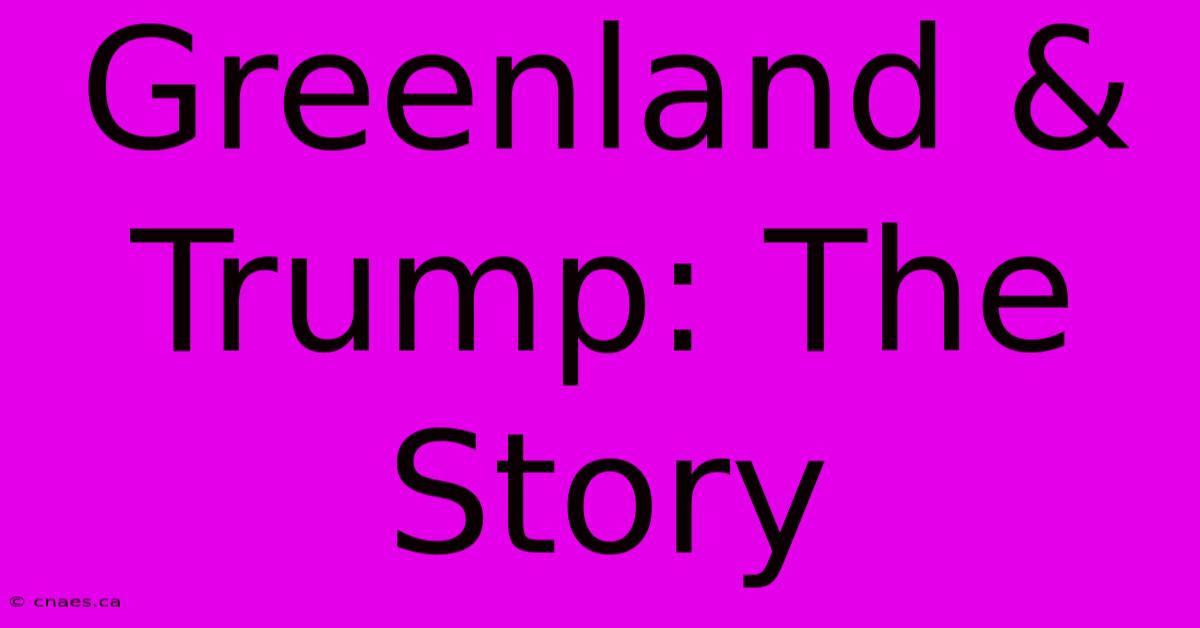Greenland & Trump: The Story

Discover more detailed and exciting information on our website. Click the link below to start your adventure: Visit My Website. Don't miss out!
Table of Contents
Greenland & Trump: The Story of a Failed Deal and a Lasting Impact
The summer of 2019 saw an unusual geopolitical ripple: President Donald Trump's surprising interest in purchasing Greenland. The idea, quickly dismissed by the Danish government, sparked global headlines and raised questions about US foreign policy, Greenland's sovereignty, and the very nature of international relations in the 21st century. This article delves into the story, exploring the context, the reactions, and the lasting implications of this audacious proposal.
The Seeds of a Controversial Idea: Why Greenland?
Greenland, a vast, self-governing territory within the Kingdom of Denmark, holds strategic and economic importance. Its location, bordering the Arctic Ocean, makes it a crucial player in the increasingly competitive Arctic region. Resources, including rare earth minerals and potentially vast oil and gas reserves, are a significant draw. Furthermore, the melting ice cap opens up new shipping routes and access to previously inaccessible resources, attracting global interest.
The Trump administration, focused on asserting US influence globally, likely saw Greenland as a valuable asset in this context. The narrative around acquiring Greenland likely stemmed from a confluence of factors:
- Strategic advantage: Control over Greenland would enhance US military positioning and influence in the Arctic, particularly concerning competition with Russia and China.
- Resource acquisition: Access to Greenland's natural resources would be a significant economic boon.
- National security concerns: The potential for other nations (like China) to gain influence in the Arctic likely fueled concerns about national security.
The Public Reaction: Outrage and Amusement
Trump's suggestion, first reported by the Wall Street Journal, was met with a mixture of disbelief, amusement, and outrage. The Danish government swiftly and firmly rejected the idea, with Prime Minister Mette Frederiksen stating that Greenland was "not for sale." The response highlighted the fundamental principle of self-determination and the deeply ingrained sensitivities surrounding colonialism.
The international community largely sided with Denmark and Greenland, with widespread criticism of the proposal as unrealistic and potentially offensive. The episode became a source of mockery and satire, highlighting the perceived lack of diplomatic sensitivity on the part of the Trump administration.
Greenland's Perspective:
For Greenland, the episode underscored the need to assert its own autonomy and sovereignty. While the proposal was ultimately unsuccessful, it served as a catalyst for renewed conversations about Greenland's future and its relationship with Denmark. The incident demonstrated the island's capacity for international diplomacy and its determination to chart its own course.
Long-Term Implications: Beyond the Headlines
While Trump's attempt to buy Greenland failed, the episode left a lasting mark. It highlighted the growing geopolitical competition in the Arctic and increased international awareness of Greenland's strategic importance. The event also served as a reminder of the complexities of international relations and the importance of respecting national sovereignty.
The episode likely contributed to a strengthened sense of national identity within Greenland and reinforced the country's determination to pursue its own economic and political path, balancing its unique relationship with Denmark against growing interest from other global powers.
In conclusion, the "Greenland for sale" saga was more than just a bizarre news cycle; it represented a significant, if ultimately unsuccessful, attempt to reshape the geopolitical landscape of the Arctic. The event continues to inform discussions around sovereignty, resource management, and the increasingly important Arctic region.

Thank you for visiting our website wich cover about Greenland & Trump: The Story. We hope the information provided has been useful to you. Feel free to contact us if you have any questions or need further assistance. See you next time and dont miss to bookmark.
Also read the following articles
| Article Title | Date |
|---|---|
| Paris Landmark Evacuated Fire Alarm | Dec 24, 2024 |
| Track Santa Norads Journey | Dec 24, 2024 |
| Christmas Liquor Store Closings Kansas | Dec 24, 2024 |
| Salmonella Costco Egg Recall In Texas | Dec 24, 2024 |
| Mangione Enters Innocent Plea | Dec 24, 2024 |
